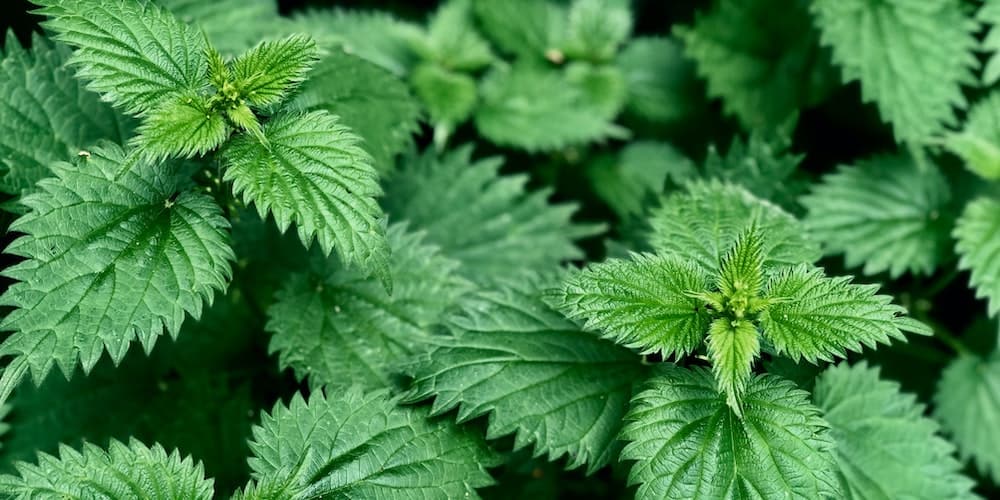BENEFITS OF NETTLE
✓ Nourishes and remineralizes the body
✓ Reduces blood pressure
✓ Relieves benign prostatic hyperplasia
✓ Alleviates allergies
✓ Eases joint pain
What is nettle?
Nettle (Urtica dioica) is a common plant found in the countryside and gardens. It belongs to the Urticaceae family, which includes various species of the Urtica genus. Although other species have interesting properties, it is especially Urtica dioica, or “great nettle,” that is used in herbal medicine. Its leaves, stems, and roots are utilized.
Originally from Eurasia, it now grows throughout Europe and North America. It can reach up to 1.60 m in height, forming upright stems and producing dark green, toothed leaves, covered with hairs.
Nettle grows thanks to thin roots. It particularly favors humid areas, ditches, and roadsides. Like horsetail and plantain, it is part of the bioindicator plants: its presence indicates humus-rich soil, rich in nitrogen.
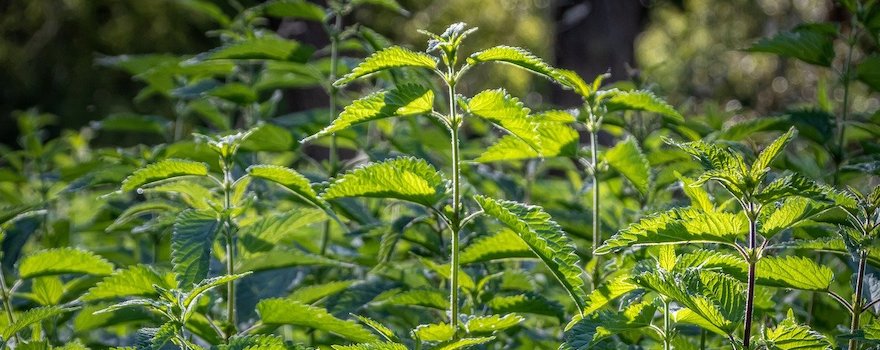
Nettle has a long history behind it. According to this review, it has been used since antiquity as a natural remedy for relieving gastrointestinal diseases, rheumatic pain, hypertension, and even diarrhea.
It is also a valuable food resource in Nepal, Poland, Turkey, and Iran. In Italy, fibers from its stems are even used for making textiles, akin to hemp fibers.
Unfortunately, it is mainly known for its prickly and stinging leaves that cause terrible itching. But nettle is not a weed. Quite the opposite!
Its leaves and roots contain vitamins, minerals and trace elements, amino acids, antioxidants… A composition that gives it a very wide range of health benefits.
Thus, nettle is recognized for its nourishing and remineralizing effects, for reducing blood pressure, relieving benign prostatic hyperplasia and allergies. It is also being studied as a therapeutic prospect for cancer treatment.
Nutritional composition
- 17 amino acids including the 8 essential ones
- Vitamins: provitamin A, B1, C, E, K
- Minerals and trace elements: calcium, potassium, silica, zinc, boron, sodium, phosphorus, copper
- Proteins
- Flavonoids: kaempferol, quercetin
- Polysaccharides
- Phenolic acids: chlorogenic acid, quinic acid
- Phytosterols: stigmasterol
- Lipids
- Lignans
- Tannins
- Chlorophyll
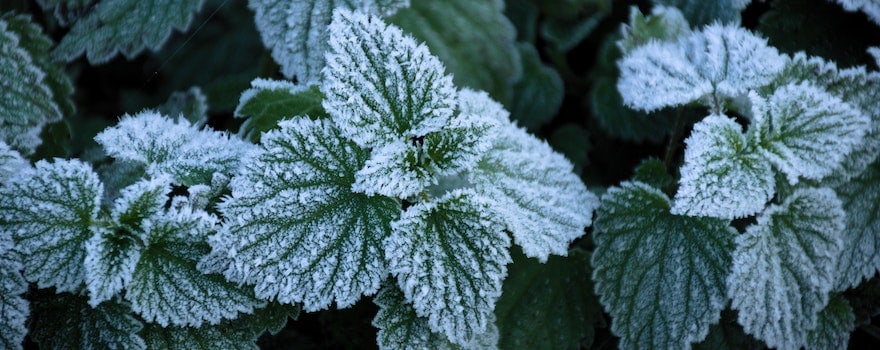
The benefits of nettle
🍽 Nourishes and remineralizes the body
Nettle is known for its nourishing action due to its varied and very complete composition. Its leaves are particularly rich in vitamin C (333 mg per 100 g), in fibers (3.11 g per 100 g), in proteins, in calcium, and in potassium.
Moreover, they contain 17 amino acids including the 8 essential ones like lysine, leucine, and phenylalanine. Its consumption is therefore interesting for providing additional nutrients and to prevent or fill nutritional deficiencies.
With its content in alkaline minerals (potassium, magnesium, calcium…), nettle is capable of remineralizing the body and restoring the body’s acid-base balance. It thus contributes to the proper functioning of physiological processes.
This study from Ege University (Turkey), conducted directly on harvested nettles, shows the complete composition of their leaves.
❤️ Reduces blood pressure
Nettle is traditionally used for blood pressure disorders, especially in cases of hypertension. It indeed exerts antihypertensive and antioxidant effects that help reduce both systolic and diastolic blood pressure.
On one hand, its consumption stimulates the activity of superoxide dismutase, an antioxidant enzyme involved in eliminating free radicals. These, in turn, induce oxidative stress, closely linked to the onset of hypertension.
On the other hand, nettle induces vasorelaxation which dilates blood vessels and eases blood pressure. Thus, it acts like calcium channel blockers, commonly prescribed to manage high blood pressure.
This study from the University of Belgrade (Serbia), conducted on hypertensive rats, demonstrates how the antioxidant activity of nettle reduces blood pressure.
This other study from the University of Abbottabad (Pakistan), also conducted on rats, explains the mechanism of action of nettle in reducing hypertension.
🎈 Relieves Benign Prostatic Hyperplasia
Like maca, nettle shows beneficial effects on benign prostatic hyperplasia (BPH), a benign tumor characterized by an increase in prostate size. It effectively reduces symptoms associated with this condition, notably at the urinary tract level.
Thus, the consumption of nettle improves the IPSS (International Prostate Symptom Score), the international questionnaire used for screening, diagnosing, and monitoring BPH symptoms. This plant increases urine volume, prevents urinary infections, and reduces prostate size. It alleviates these symptoms thanks to the phytosterols, lignans, and polysaccharides it contains.
This study from the Shaheed Beheshti University of Medical Sciences (Iran), conducted on men, shows the beneficial effects of nettle on BPH symptoms.
This other study from the Department of Urology at the University of Essen (Germany), conducted on men, explored nettle as a long-term treatment for BPH.
🤧 Relieves Allergies
Nettle has an interesting action for relieving allergies and symptoms of allergic rhinitis: nasal congestion, sneezing, tearing… For this, it acts directly on the allergic responses triggered by the body.
This plant notably acts against the H1 receptor of histamine, involved in the immune response. It also inhibits tryptase, an enzyme released simultaneously with histamine and responsible for the symptoms of allergic reactions.
Read also the A Natural Antihistamine to Relieve Allergies? Here are 10
In the context of allergic rhinitis, this plant significantly reduces the average number of eosinophils, specific white blood cells that multiply in response to allergy manifestations. Finally, it acts on inflammation in the nasal mucosa.
This study from the Mashhad University of Medical Sciences (Iran), conducted on patients with allergic rhinitis, shows the effectiveness of nettle in relieving their symptoms.
This other study from HerbalScience Group LLC (United States), conducted during a clinical trial, demonstrates the action of nettle on the allergic response.
🤸🏻♀️ Relieves Joint Pain
Thanks to its anti-inflammatory action, nettle is a valuable plant for relieving joint and rheumatic pain. Thus, its consumption is indicated in cases of arthritis, osteoarthritis, or rheumatoid arthritis.
It affects both pain relief and the progression of the pathology. Its consumption notably suppresses the production of cytokines, pro-inflammatory substances that lead to cartilage degradation. It also inhibits the activity of the inflammatory transcription factor NF-kB.
This study from the University of Tübingen (Germany), conducted on human cell lines, shows the anti-inflammatory action of nettle leaves on rheumatoid arthritis.
🔬 Potentially Anti-Cancer
Nettle is currently being studied for its potential anti-cancer effects, notably in cases of prostate cancer.
It seems to act on the activity of adenosine deaminase (ADA), an enzyme present in prostate tissue. It also reduces the proliferation of cancer cells and induces their apoptosis (programmed cell death).
This study from Babol University of Medical Sciences (Iran), conducted on human cell lines, shows how nettle induces apoptosis of breast cancer cells.
This other study from the University of Marburg (Germany), conducted on cancer cells, shows the antiproliferative effect of nettle.

How to consume nettle?
Nettle in tablets
Nettle can be found in tablets, capsules, and pills. They contain dried nettle that is then reduced to powder. This is the simplest format and the easiest to find in stores, specialized shops, or online.
The tablets have the advantage of not conveying the “vegetal” taste and pronounced flavor of the plant, which may not appeal to everyone. To avoid taking too many tablets per day, choose a dietary supplement with sufficient dosage (minimum 400 mg of nettle per tablet).
Nettle powder
Nettle powder is useful to enjoy the plant’s properties in cooking. It has a fairly neutral taste, allowing it to accompany many dishes: soups, salads, sauces, and dressings… You can also make a delicious green smoothie with nettle powder and spirulina.
Fortifying, this powder can also be used for hair care. Add a pinch of powder into your shampoo or homemade hair mask.
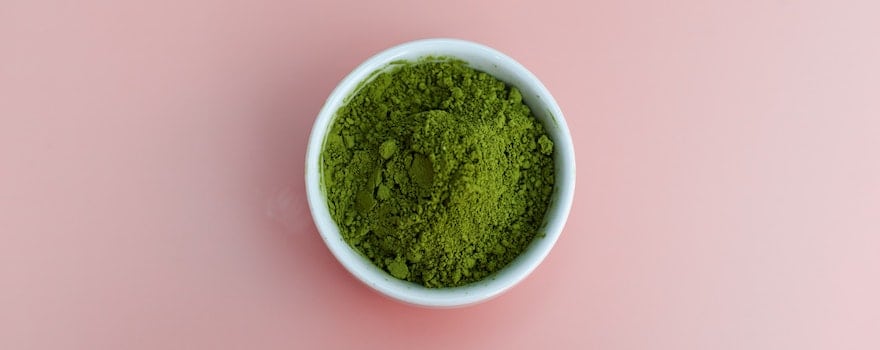
Dried nettle leaves
Dried nettle leaves, offered in bulk or in bags, are ideal for making infusions or decoctions, to be drunk several times a day. Although slightly sweet, the taste of nettle infusion is quite earthy. You can make a more gourmet drink by adding a pinch of cinnamon or turmeric.
Count 3 tablespoons of dried leaves for 500 ml of water. Let steep for 10 minutes and enjoy.
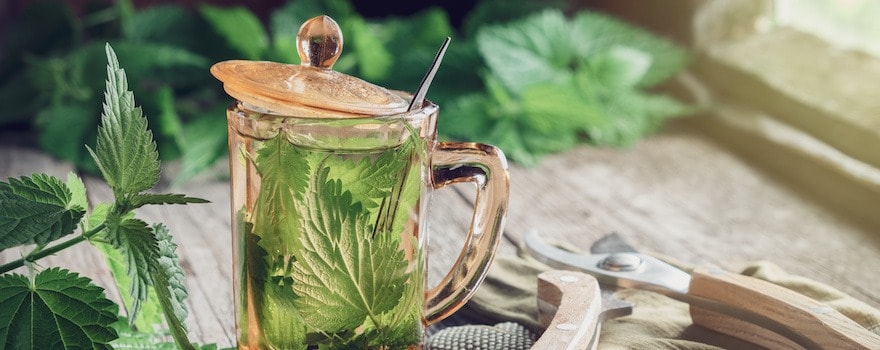
Nettle mother tincture
Nettle mother tincture is obtained by hydro-alcoholic extraction of the aerial parts. It is concentrated in active ingredients but has the disadvantage of containing alcohol. Therefore, the mother tincture is not recommended for pregnant women, children, or people with certain conditions.
Nettle and medicinal plants
To relieve the symptoms of benign prostatic hyperplasia, nettle can be combined with maitake, a Chinese medicinal mushroom, pumpkin seed oil, and maca.
The combination of nettle, ginger and turmeric is ideal for boosting the immune system.
To concoct a complete medicinal tea, dried leaves can be accompanied with chamomile flowers and lemon balm leaves.
Sustainable consumption: choose organic, local, and fair-trade nettle
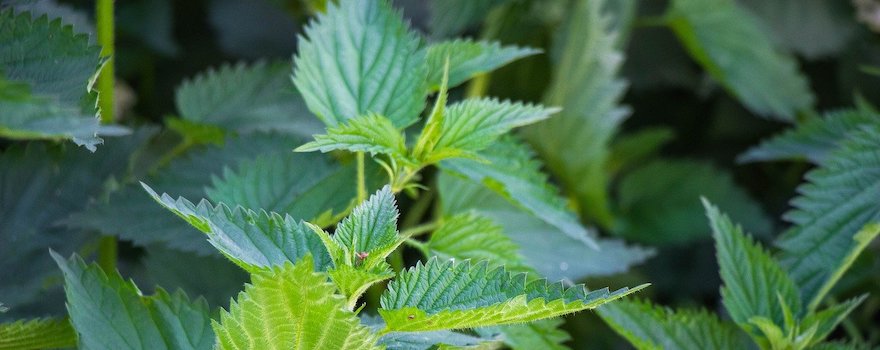
✓ The advantage of nettle is that it grows in all temperate regions. It’s a common plant easily found in meadows, along roadsides or rivers… It’s therefore easy to harvest leaves yourself to take advantage of their virtues (remember to wear gloves!).
✓ You can also sow seeds directly in your garden. For this, choose a place where it won’t be a nuisance as this plant reproduces quickly and can become invasive.
✓ Many French producers also offer dried nettle leaves sold in bulk or in bags. If you opt for this solution, choose those cultivated in organic agriculture and far from sources of pollution. Indeed, the plant tends to accumulate heavy metals, pollutants, and chemical substances present in the soil.
✓ If the nettle is not from France, inquire about its exact origin and choose fair trade channels that support local producers’ work.
Dosage
There is really no recommended dosage for nettle consumption. It is a safe plant with very few side effects, as long as it is not consumed in excess.
Nettle can be taken long-term, for 3 weeks every month, for a deep action on the body.
💊 In tablets : 2 to 3 tablets per day for 400 mg tablets
🍵 In infusion : 2 to 3 cups per day
🥄 In powder : 1 to 3 teaspoons per day
🥃 In mother tincture : 20 to 30 drops in a glass of water, 3 times a day
Contraindications and side effects
Consuming nettle has certain contraindications :
- As a precaution, it is not recommended for pregnant and breastfeeding women and young children
- Due to its diuretic action, people with low blood pressure or kidney insufficiency should avoid consuming it
- It is not recommended for people suffering from hemochromatosis (excess iron) or asthma
- It can interact with certain medications for blood coagulation and high blood pressure.
Excessive consumption of nettle may cause the following side effects :
- Increased urine volume
- Allergic reactions
- Nausea
- Diarrhea
If you experience any side effects, stop consuming it and consult a doctor.
History, culture, and market of nettle
Nettle leaves are not only medicinal. They are also an excellent food source. In popular tradition, they are consumed raw or cooked, like spinach. They are also used as a vegetable rennet to curdle milk and produce fresh cheese.
Nettle is also valuable for biodiversity as it is a host plant for many insects: butterflies, beetles… Furthermore, it is useful in agriculture as it promotes beneficial insects and attracts natural predators of crop pests. Therefore, we have every interest in letting nettle fields grow!
Report by Julia Perez and Charlotte Jean
Sources and scientific studies
Semih Otles et Buket Yalcin, 2012. Phenolic Compounds Analysis of Root, Stalk, and Leaves of Nettle.
Laban K. Rutto, Yixiang Xu, Elizabeth Ramirez, et Michael Brandt, 2013. Mineral Properties and Dietary Value of Raw and Processed Stinging Nettle (Urtica dioica L.).
Una-Jovana Vajic, Jelica Grujic-Milanovic, Zoran Miloradovic, Djurdjica Jovovic, Milan Ivanov, Danijela Karanovic, Katarina Savikin, Branko Bugarski, Nevena Mihailovic-Stanojevic, 2018. Urtica Dioica L. Leaf Extract Modulates Blood Pressure and Oxidative Stress in Spontaneously Hypertensive Rats.
Rahila Qayyum, Hafiz Misbah-Ud-Din Qamar, Shamim Khan, Umme Salma, Taous Khan, Abdul Jabbar Shah, 2016. Mechanisms Underlying the Antihypertensive Properties of Urtica Dioica.
Mohammad Reza Safarinejad, 2005. Urtica Dioica for Treatment of Benign Prostatic Hyperplasia: A Prospective, Randomized, Double-Blind, Placebo-Controlled, Crossover Study.
T Schneider, H Rübben, 2004. [Stinging Nettle Root Extract (Bazoton-uno) in Long Term Treatment of Benign Prostatic Syndrome (BPS). Results of a Randomized, Double-Blind, Placebo Controlled Multicenter Study After 12 Months].
Mehdi Bakhshaee, Amir Hooshang Mohammad pour, Majid Esmaeili, Farahzad Jabbari Azad, Ghazal Alipour Talesh, Maryam Salehi, and Morteza Noorollahian Mohajera, 2017. Efficacy of Supportive Therapy of Allergic Rhinitis by Stinging Nettle (Urtica dioica) root extract: a Randomized, Double-Blind, Placebo- Controlled, Clinical Trial.
Bill Roschek Jr, Ryan C Fink, Matthew McMichael, Randall S Alberte, 2009. Nettle Extract (Urtica Dioica) Affects Key Receptors and Enzymes Associated With Allergic Rhinitis.
Kristina Riehemanna, Bert Behnke, Klaus Schulze-Osthoffa, 1999. Plant extracts from stinging nettle (Urtica dioica), an antirheumatic remedy, inhibit the proinflammatory transcription factor NF-κB.
Sadegh Fattahi, Elham Ghadami, Mohsen Asouri, Ali Motevalizadeh Ardekanid, Haleh Akhavan-Niaki, 2018. Urtica Dioica Inhibits Cell Growth and Induces Apoptosis by Targeting Ornithine Decarboxylase and Adenosine Deaminase as Key Regulatory Enzymes in Adenosine and Polyamines Homeostasis in Human Breast Cancer Cell Lines.
Extract, L Konrad, H H Müller, C Lenz, H Laubinger, G Aumüller, J J Lichius, 2000. Antiproliferative Effect on Human Prostate Cancer Cells by a Stinging Nettle Root (Urtica Dioica).
Sabrina Esposito, Alessandro Bianco, Rosita Russo, Antimo Di Maro, Carla Isernia, and Paolo Vincenzo Pedone, 2019. Therapeutic Perspectives of Molecules from Urtica dioica Extracts for Cancer Treatment.


